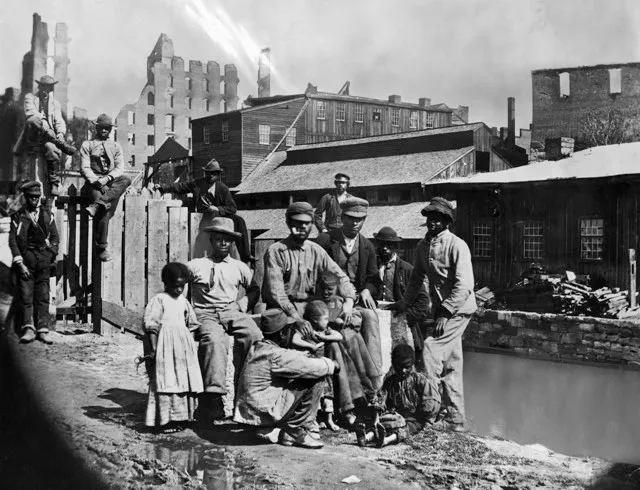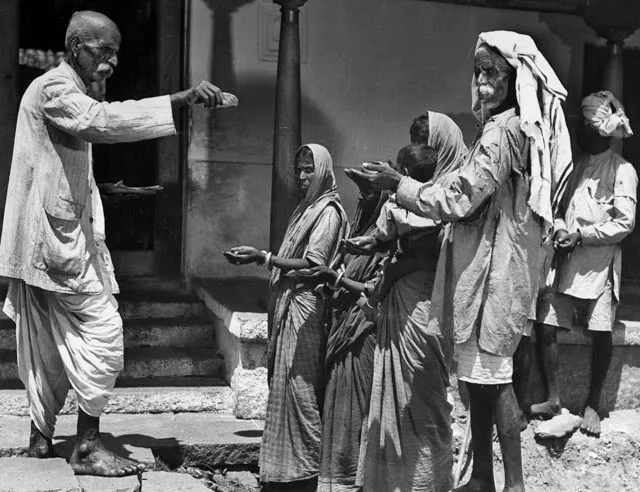Why did you decide to write a book about race science?
I grew up as an ethnic minority in London at a time when it was a very racist place, during the 80s and 90s. For me, the big event that kind of overshadowed my teenage years was the Stephen Lawrence murder – I lived quite close to where he was killed. It was quite a dark place anyway: the BNP bookshop was nearby and they used to march in my town quite regularly.
This is the book I always wanted to write. I think we’re living in an age when there’s a rise in racism, the far right and nationalism. I never imagined that politics would take such a dark turn again, but here we are.
More inspirations interviews:
- How can we save our planet? - Sir David Attenborough
- Medical ethics: what happens when the specialist becomes the patient?
Whatever else is happening in science, over the last 50 to 70 years race has crept back into the discourse. We’re constantly told race is a social construct and has no basis in biology. Yet when you look at what population geneticists write, or what medical researchers write, they’re constantly using racial categories as if they’re real.
I wanted to get to the heart of that. Which is it? Is race real? Or is it a social construct? And if it’s muddier than that, then where do the blurry lines lay and how can we understand them?
Yet many scientific studies still split people by race, by saying that African Americans or Hispanics are more likely to get certain diseases, for example…
We have to remember the US guides the rest of the world when it comes to this kind of research. For quite a while they’ve been collecting data by race. And just having that data invites comparisons, which then causes problems.
But also in America, race, class and social status all run along the same lines. So, black Americans still live in much worse circumstances, on average, than white Americans. They’re more likely to live in poorer areas, to be exposed to toxic things, to have poorer diets, poorer education systems and poorer access to healthcare than white Americans.

Black Americans die at a greater rate than white Americans in almost category, even infant mortality, which is quite shocking. To look at that and suggest that it’s down to something genetic and innate to black Americans, to me, is just bizarre. That this one group should be so biologically disadvantaged that they would die of everything at greater rates than everybody else just beggars belief.
And yet, what you repeatedly see in the medical literature is that we are looking for genetic reasons for these health disparities. You don’t need to look at genetics because there are so many other explanations for why these gaps exist.
Are the trends you see in America replicated in other parts of the world?
No, and again, weird and elaborate explanations are used to explain why black Americans suffer disproportionately from so many diseases, when black Africans don’t.
So, for example, hypertension. Black Americans have higher rates of hypertension than white Americans. Black Britons have higher rates of hypertension than white Britons – in fact, NICE [National Institute for Health and Care Excellence] guidelines advise doctors to give different drugs to patients under the age of 55 if they’re black than if they’re white (section 16.8).
Now, why do they do this when we know that the lowest rates of hypertension in the world are in Africa, and the highest adjusted rates of hypertension in the world are among the Finnish, Russians and Germans. Yet there’s this lingering belief that there is something about these communities and how they evolved that makes them different. But the evidence for that just isn’t there.
In America, drugs are targeted at black people, at Hispanic people. And you have to remember, Hispanic means absolutely nothing genetically. This is a group of people so hugely disparate in their ancestries. Being Hispanic could mean that you have African ancestry, or European ancestry, or Native American ancestry.
Even at a deeper level, there is little genetic basis to race anyway. And that strikes us as surprising because we think we are all different, but we all completely overlap and it’s only at the margins that you see a tiny bit of difference.
It is perfectly possible for me to have more in common genetically with my white neighbour than with my Indian neighbour. But we don’t think of it that way. We think that because of my Indian heritage, I’ll have more in common genetically with every other Indian on the planet, but that’s not the case.
It seems there is still a widespread belief that there are differences though…
Yes. And I think it’s an easy thing to do. We look at the world, we see the preponderance of certain people doing certain things and we conflate that with our existing ideas about race. We categorise so easily.
Over the last few hundred years, categories have been created that have been so important socially and politically. These categories are the basis of subjugation, repression, slavery, colonialism… Our politics is steeped with it and because of that our cultures are steeped with it.
We just can’t think outside these categories and so every piece of information we have about human difference gets reframed within these categories. But when you know the genetics of it, it doesn’t make any sense.
It just doesn’t, they don’t tie up with each other.
So, how did science first start getting tangled up with race?
In relatively recent history – I’m talking about the last few thousand years or so – whenever you have dominant groups, their power begins to be framed as natural, as well as just political or a product of historical factors.
One of the examples I look at in my book is India. The caste system there is essentially like a class or a racial hierarchy. It’s a biological system that says, by dint of your birth, this is your place in the social hierarchy.

That has been around for hundreds of years, possibly thousands. This is a group of people saying that they are biologically superior to everybody else, and the people below them in the hierarchy have their places and have to stick to those places. There is little sense of social mobility.
Things have changed in recent years, but that prejudice is still there. There’s no doubt.
These ideas about natural superiority and dominance have been there for a long time. And you first see the science of race emerging during the Enlightenment. At the birth of modern, Western and European science, scientists like Carl Linnaeus [the Swedish botanist] started the taxonomies of the natural world and, of course, started with humans.
And, again, the sense of a hierarchy was there, that the white man – and we have to remember that women were slotted into this hierarchy below men – is the most superior. Quite convenient for all these white, male, European scientists that everyone else happened to be inferior to them. And this is how it continued.
What was the most surprising discovery you made while researching the book?
It was a very personal journey for me, and painful in many ways because these are issues that have affected me my entire life. But now with the rise of the far right, it hits home even more.
You see the kind of gross manipulation of the sciences – not just by people outside the sciences, abusing science because of their politics; this is scientists abusing science. It’s become embedded within the scientific method, within the structures of science and the way we categorise people and think about human differences. And I think that, for me, is the darkest and most dangerous aspect of this.
Listen to our Science Focus Podcast interviews featuring Angela Saini:
We know that there have been Nazi scientists, that there have been scientific racists. The people who didn’t want to let go of segregation in the US, who wanted to maintain slavery, who wanted to maintain colonialism, who want to ban immigration, racial mixing, who don’t want people to have babies with people of different races or heritages. Those people have always been there and, frankly, I wonder if they’ll always be there because there will always be hateful people like that in the world.
What disturbs me more is that mainstream, good, liberal and well-meaning scientists have also not let go of these ideas. They keep bringing them back in the way they think about difference. Not necessarily because they’re racist, but because they still exist in the racist frameworks that existed in the past.
We all do. That’s the way we all think about these things in this way. It’s really hard to abandon it.
Was it difficult interviewing scientists with extreme, far-right, or racist views?
I’ve encountered racism my whole life. It’s not a new and shocking thing for me to suddenly hear an intellectual saying it. I’m more used to folks on the streets saying it, so that’s perhaps the biggest difference.
It’s a mistake to think that racists are just uneducated, ignorant thugs. They are also people in power; they’re professors at universities; they’re editors of journals. People who have never been fully convinced that race is just a social construct and would like to revive race science.
Is it racist to want that? That, I think, is where the fuzzy line lays. I’d say it is, because race was just invented. It was never born out by biology and their failure to understand that betrays their racism.
But we see this argument more and more. People calling for a return to this kind of research under the banner of diversity of opinion or academic freedom. And to some extent, universities are entertaining them.
It’s only fairly recently that Jordan Peterson [the contentious Canadian psychologist] had his invitation to Cambridge University rescinded, despite his work being panned, globally, for not being very scientific and for him entertaining the ideas of Charles Murray, the co-author of The Bell Curve [a controversial book that claims to examine the connection between race and intelligence]. These ideas are being entertained because they’re coming from within the academic establishment and that’s what we have to watch out for.
The history of race science is a lesson in itself for how easy it is for science to get stuff wrong and how scientists can stick with bad ideas. So, while I have faith in the scientific method as a way of understanding the Universe, I don’t have complete faith in scientists, or the scientific establishment, to do that completely responsibly.
And that’s because we are all human and we all have our own politics. And whether we like it or not, there are scientists out there who have far-right views.
Are you concerned that racism will continue creeping into science?
I think we need to have a really thorough rethink, because I think it’s creeping in more and more. One of the reasons is ancestry testing, I think.
In a way, population genetics [the study of genetic differences between and within populations] gave birth to ancestry testing and it’s reinforced the idea that race is real. Because you go and have a DNA test done and it tells you you’re 96 per cent south Asian, or 50 per cent this and 50 per cent that. Well, how can it do that unless there is some genetic basis to race?
That’s the kind of paradox that we’re dealing with here. On the one hand, we’re told race isn’t real and the on the other you have a DNA test telling you that it is. Scientists know there are tiny statistical differences between population groups, and the DNA companies then conflate these with social categories of race. And what genetics and ancestry testing does is create the illusion that there is more to this than there is.
At the end of the day, that’s the scientists’ fault. It’s not the DNA companies’ fault – they just took what they were given.
DNA tests can tell you how much Neanderthal you’ve got in you. Can you tell us about the changing views of Neanderthals?
Historically, when Neanderthal remains were first discovered, what did European scientists do? They compared them to Aboriginal Australians. And the reason they did that was because they thought that Aboriginal Australians were somehow lower down the evolutionary ladder, and so were Neanderthals.
Aboriginal Australians were treated abominably, physically degraded and deliberately wiped out. To me, it feels like genocide how these people were treated. The race science was always there, this idea that, somehow, they were doomed to go extinct because they were like the Neanderthals, and that the more superior, evolved humans would come along and supplant them. And that this was somehow nature’s way.
Read more:
- Can transgender athletes be fairly integrated into women's sports?
- Wally Funk: a story of sexism in the race for space
But then we see that Europeans have some shared heritage with Neanderthals and suddenly they undergo this huge image change. The number of articles I’ve read recently saying that Neanderthals were smarter than we first thought, that they were wiser, that they were more sensitive, that they were wiped out not because they were stupid, but because of some kind of unfortunate consequence of history. How the hell did this happen? How did we get to here?
We know next to nothing about the Neanderthals. What we’re doing is projecting our ideas of what they must be based on our racial ideas of who we are. And this is a perfect example of the kind of pernicious legacy of race science. That within this one story, we can see just how much we still buy into the idea of a racial hierarchy.
But I think it’s important to remember that this isn’t like a white disease. It’s not white people who do this to everybody else. We all do it to each other. In India you see the caste system. In China it’s still taught that the Chinese people did not originate in Africa, that they evolved from an early form of Homo erectus in China.
And again, this serves myths about who we are and that we have a particular claim to superiority because we are different. And you see it everywhere. I think that’s a sad thing. You see it everywhere.

Follow Science Focus onTwitter,Facebook, Instagramand Flipboard

